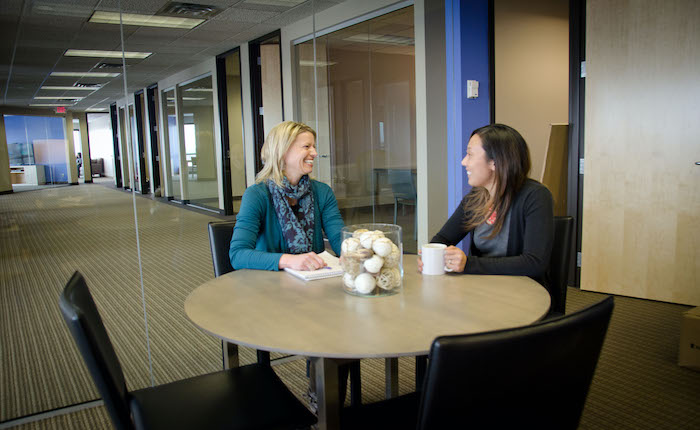No matter your industry or what you’ve achieved in your career, know that you can always benefit from having a mentor. And likely, someone else could benefit from having you as a mentor as well. But why? Why is mentoring so valuable? And how do you find a mentor or become one? Read on, and my colleagues and I, will answer these questions.
“They’re like magic mirrors”
For many, one of the greatest benefits that come from having a mentor is that they offer a unique third-party perspective that would be impossible to get any other way. Jeff Mahmud, advertising account executive at the Minneapolis-St. Paul Business Journal says, “Great mentors are like magic mirrors you don’t always want to look at. Either it shows you something you don’t want to see or something you can’t see yourself. Either way, they are the ones who help you see yourself more clearly.”
And seeing oneself more clearly can certainly help us identify areas that need improvement so we can become better leaders, employees, and human beings, but it can also help us take a step back and see just how amazing we are as well. Now while this post isn’t about women specifically, March is Women’s History Month and it’s worth pointing out that 75% of women executives surveyed in a recent KPMG study experience imposter syndrome, often defined as a collection of feelings of inadequacy that persist despite evident success. Mentorship can be an effective tool to combat imposter syndrome.
Jamie Gassmann, director of marketing for R3 Continuum, shares: “I have had the absolute pleasure to be mentored by Linda Siggau, the co-owner and creator of the company Experience Happiness. She has helped to shape me as a better marketer and female leader. Linda has been an inspiration and helped me see myself through a different lens both as a person and a professional. I’m a better person overall because of her. She has helped me to be a more confident female leader, to believe in myself, to have more of an executive presence, identify the signs of burnout and to advocate for myself. I believe all leaders should have a coach/mentor they can learn from, who can help them grow personally and professionally — someone who can help you work on your flaws and showcase your strengths.”
Jen Bellmont, Bellmont Partners COO (and one of my personal mentors!) agrees: “I’d say the biggest impact my mentor had on me was making me believe in myself and instilling confidence, teaching me to trust my gut. That advice was more poignant than any industry-related tips she shared. And I try to do the same for others as often as I can.”
Who can be a mentor?
In short — anyone! Professionally, the mentors who have had the greatest impact on me were also people I worked alongside or reported to – people like Sara Cziok, Laura Boyd, HaiVy Thompson and Liz Nicklos. And when I was in graduate school, my professors, especially Marco Yzer and Brian Southwell played that role.
But, as Mahmud points out, “It’s important to remember that great mentors don’t need to be superiors. They can be peers or even people who report to you. Sometimes they prove to be the most impactful.”
So, if you’re looking for a mentor or a mentee, you might not need to look very hard. There are likely people in your life already who can play this role, either formally or informally. There are also more formalized mentorship programs you can find through a little bit of research – typically affiliated with schools, networking groups, or industry professional associations.
One final note: Not all mentor/mentee relationships are going to be the right fit! And that’s OK. You should genuinely feel comfortable consulting your mentor to process other aspects of your life – not just career-related goals or challenges. If you’re not, we’d encourage you to seek out another trusted contact. And it’s definitely okay – even beneficial – to have multiple people you consider mentors.
If you’re searching for a mentor in the communications space, feel free to drop us a line! We’d love to try and help make a connection for you.

